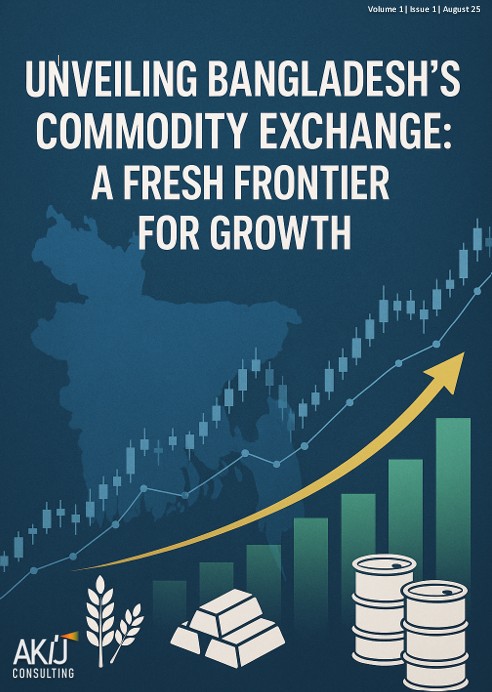𝗨𝗻𝘃𝗲𝗶𝗹𝗶𝗻𝗴 𝗕𝗮𝗻𝗴𝗹𝗮𝗱𝗲𝘀𝗵’𝘀 𝗖𝗼𝗺𝗺𝗼𝗱𝗶𝘁𝘆 𝗘𝘅𝗰𝗵𝗮𝗻𝗴𝗲: 𝗔 𝗙𝗿𝗲𝘀𝗵 𝗙𝗿𝗼𝗻𝘁𝗶𝗲𝗿 𝗳𝗼𝗿 𝗚𝗿𝗼𝘄𝘁𝗵
Bangladesh is entering a pivotal moment in market modernization. A national commodity exchange can transform fragmented trade into a transparent, efficient, and investable system—stabilizing prices for farmers, de-risking procurement for industries, and opening doors for global investment.
𝗪𝗵𝘆 𝗡𝗼𝘄?
- Structural Need: Traditional bazaar systems face inefficiencies—price volatility, reliance on middlemen, and post-harvest losses as high as 30%.
- Policy momentum: Bangladesh’s first licensed commodity exchange is taking shape, paving the way for regulated spot and futures markets.
- Global precedent: Around the world, commodity exchanges drive price discovery, risk management, and transparency. It’s time for Bangladesh to adapt these benefits at scale.
𝗢𝗽𝗽𝗼𝗿𝘁𝘂𝗻𝗶𝘁𝗶𝗲𝘀 𝗔𝗵𝗲𝗮𝗱
- Unlock better farmer incomes with structured trading
- Reduce waste through modern warehousing & cold chain
- Enable digital participation via broker platforms and mobile apps
- Support industries like RMG ($38.5B in 2024) with hedging tools to manage raw material cost volatility
- Strengthen export competitiveness with a regulated, future-ready market
𝗣𝗼𝗹𝗶𝗰𝘆 𝗣𝗿𝗶𝗼𝗿𝗶𝘁𝗶𝗲𝘀 𝗳𝗼𝗿 𝗦𝘂𝗰𝗰𝗲𝘀𝘀
- National standards & grading systems
- Tax & duty alignment for adoption
- Strong governance to ensure market integrity
- Access to financing through warehouse receipts & margin facilities
𝗧𝗵𝗲 𝗕𝗼𝘁𝘁𝗼𝗺 𝗟𝗶𝗻𝗲:
A well-governed commodity exchange can be Bangladesh’s next productivity engine—linking farmers to finance, industries to risk management, and the nation to global value chains. The blueprint is ready—execution will decide how fast this frontier becomes a flywheel for inclusive growth.
Full Article: 𝗨𝗻𝘃𝗲𝗶𝗹𝗶𝗻𝗴 𝗕𝗮𝗻𝗴𝗹𝗮𝗱𝗲𝘀𝗵’𝘀 𝗖𝗼𝗺𝗺𝗼𝗱𝗶𝘁𝘆 𝗘𝘅𝗰𝗵𝗮𝗻𝗴𝗲







